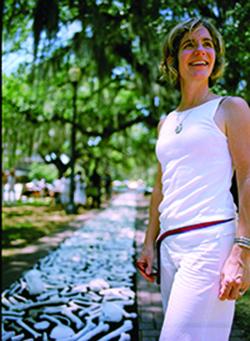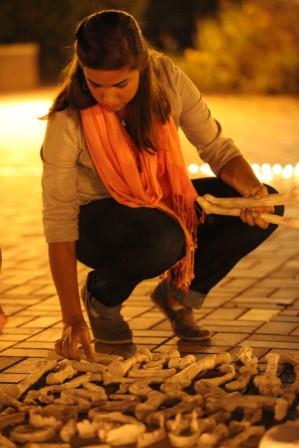Doctoral student highlight: Jane McPherson

Doctoral candidate Jane McPherson’s research examines the area where social work and human rights intersect. Upon entering the doctoral program at the FSU College of Social Work, she was awarded FSU’s Presidential Scholarship, providing her four years of support from the University. In 2013, the Graduate School honored her with the Graduate Research & Creativity Award and the Graduate Leadership Award. And, in recognition of her leadership in the One Million Bones project, the Tallahassee Democrat also named her one of 2013’s “25 Women You Need To Know.” Jane lives in Tallahassee with her husband and two teenaged children.
What is your area of research interest?
JANE: My research revolves around a central question: What is a human rights approach to social work practice? Human rights have only recently been integrated in the social work curriculum, so most of my work takes me into uncharted territory—something I find slightly scary and very exciting.

Bones/FSU & BSW student
(Photo by: Joesph LaBelle).
How has your research evolved at CSW?
JANE: In order to explore this new area of “human rights social work,” I’ve tried a variety of strategies. My first independent project at FSU used grounded theory methods to explore the challenges women experience in pursuit of their right to asylum (McPherson, 2013). This research was inspired by my ongoing practice experience working at the Torture Abolition and Survivor Support Coalition in Washington, DC, where I continue to supervise the social services program. For my next project, I spent 6 weeks observing and cataloging rights-based social work interventions in Brazil, a country where social rights, including “education, health, work, leisure, security, social security, protection of motherhood and childhood, and assistance to the destitute,” are constitutionally guaranteed (if not always provided). In Sao Paulo, for example, I spent time at Infancia Saudavel, a program similar to Florida’s Healthy Start; in addition to the home visits, baby weighing and child development monitoring that we provide in the US, the Brazilian program includes maternal education on citizen rights and encourages formation of solidarity groups to champion women’s rights to better services. My goal for this ongoing research is to locate models of rights-based practice that can be used to challenge—and improve—standard US practices.
In Dr. Neil Abell’s Measurement for Social Work Research class, I developed and validated the first two scales to measure human rights constructs in social work: Human Rights Engagement in Social Work and Human Rights Exposure in Social Work (McPherson & Abell, 2012). Then, in a project that combined research, teaching and activism, I brought a national human rights initiative—One Million Bones—to Tallahassee and incorporated the initiative into my community practice class. Using the scales that I validated previously, I was able to demonstrate that students who organized One Million Bones events scored significantly higher on both human rights exposure and engagement than similar students who were not involved in the project (McPherson & Cheatham, in press).
What are you working on now?
JANE: Currently, I’m working on defining human rights practice in social work. My dissertation will propose a definition of human rights practice, attempt to validate a scale—Human Rights Practice in Social Work—in a sample of professional social workers, and identify factors that encourage or discourage a rights-based approach to practice. This research should suggest ways that educators, trainers and supervisors can increase human rights engagement and practice in the social work workforce. My research will be the first to look at these questions, and it has potential for powerful impact as we move to incorporate human rights into social work practice. Beyond my dissertation research, I’m completing a piece with Dean Nicholas Mazza on using the arts to promote reflection in the social work classroom, and I’m working on a cross-cultural validation of the human rights engagement and exposure scales in Arabic with a colleague in Saudi Arabia.
Eventually, I hope to use my research to develop rights-based interventions: interventions that can empower clients, help solve social problems, and push US social work a bit closer to the ideals articulated so powerfully in the Universal Declaration of Human Rights.
What’s coming up for you this year?
JANE: I’ve just been appointed to a three-year term with the Council on Racial, Ethnic, and Cultural Diversity of the Council on Social Work Education (CSWE). This is a big honor for me, so I’m very excited to meet with the Council for the first time at the CSWE annual meeting this fall in Dallas, Texas. While there, I’ll also be presenting papers as part of two panels, “Applying human rights principles to U.S. social work practice through interdisciplinary collaboration” and “Human rights-based practice: Beyond the micro/macro binary in social work.” In January, I will be back in Texas for the annual meeting of the Society for Social Work Research. There, David Androff, my friend and colleague at Arizona State University, and I will convene the Social Work & Human Rights Special Interest Group and continue to grow the community of scholars interested in the field.
I am thrilled to have been invited to the Catholic University of Portugal in Lisbon in March of 2014 to participate in a panel on integrating human rights into social work. While in Lisbon, I hope to initiate research collaboration with the faculty there.
References
McPherson, J. (2013, Forthcoming.) Four factors: Assessing refugee survivors of
torture in personal and cross-national context. In Sven Hessle (Ed.), Global Social
Transformation and Social Action: The Role of Social Workers. Farnham, United
Kingdom: Ashgate Publishing, Ltd.
McPherson, J. & Abell, N. (2012). Human rights engagement and exposure in social
work: New scales to challenge social work education. Research in Social Work
Practice, 22, 704-713. doi:10.1177/1049731512454196
McPherson, J. & Cheatham, L.P. (In press.). Measuring human rights impact in social
work education: The One Million Bones example. Journal of Social Work Education.
